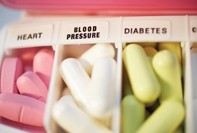Peer Reviewed
Perspectives
Diabetes and CVD: medication warnings
Abstract
Patients with both cardiovascular disease (CVD) and type 2 diabetes take medications for their CVD, their diabetes and a range of other comorbidities, and there is a great potential for dangerous medical side effects and interactions. The more serious adverse effects of oral hypoglycaemic agents are discussed.
Key Points
- Diabetes and cardiovascular disease frequently co-exist and GPs and specialists involved in cardiovascular and diabetes medicine need to be aware of the possible serious medication side effects of oral hypoglycaemic agents and interactions between them and other drugs the patient may be taking.
- The general ‘red flags’ for medication problems include renal impairment, patient frailty and polypharmacy/nonadherence.
- Metformin may have the serious side effect of lactic acidosis, and indicators of this include cardiac or pulmonary failure, shock and vitamin B1 deficiency.
- Sulfonylureas may be associated with severe hypoglycaemia, especially in patients who have a past history of hypoglycaemia, have neuropathy and live alone.
- Glitazones use may result in cardiac failure. A history of cardiac failure, oedema, diuretic use and use of NSAIDs or insulin should raise suspicion of this.
Purchase the PDF version of this article
Already a subscriber? Login here.

